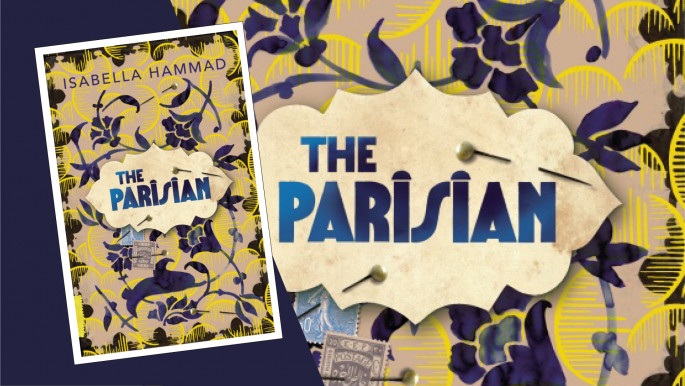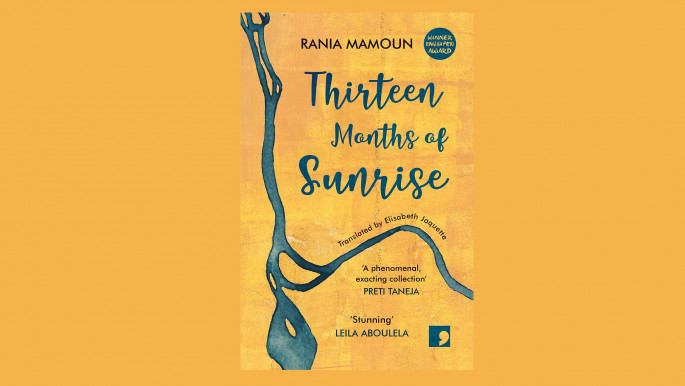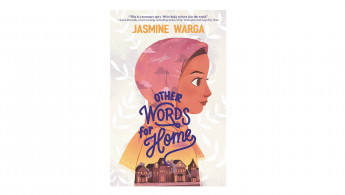Other Words for Home features the strong Muslim girl we've been looking for
"I search every day for a clue about why I deserve
to be here in Aunt Michelle's kitchen,
safe
and fed.
When so many others
just like me are not.
Lucky. I am learning how to say it
over and over again in English.
I am learning how it tastes—
sweet with promise
and bitter with responsibility."
Jasmine Warga's timely new young adult novel explores the current refugee crisis from the perspective of a child whose life is uprooted as a result of war and violence.
Jude is only a little girl when she's faced with the tough life experience of leaving her current home to start a new one in a foreign country. Any adult would struggle to make such a drastic change in their life, but it's just as hard, if not harder, for children when they become refugees because they're tasked with the hurdle of finding a new home, while building their sense of self in a world that is volatile and unpredictable.
In such a setting, we find Jude, the Muslim Girl representation we've all been waiting for.
In Other Words for Home, Jude comes from an idyllic Syrian town that had managed to avoid the violence and danger, but once peace close to home is disrupted, there's no choice but to leave if she and her mother are to have a safe chance at life.
Thus, Jude shifts her life from a small Syrian town to Cincinnati in America, a country that considers itself the centre of the world, where everything looks new and shiny, and everyone seems to be living in a comfortable, cocooned existence.
As a young Syrian refugee, Jude has faced the hard truths of life, and it is with this lens of awareness that she navigates her new home in America.
 |
As a young Syrian refugee, Jude has faced the hard truths of life, and it is with this lens of awareness that she navigates her new home in America |  |
"It is so strange to feel lucky," remarks the young narrator Jude, "for something that is making my heart feel so sad."
After landing in America, once Jude and her mother's documents are verified by immigration, Jude realises that she's one of the lucky ones to receive a second chance to build a life. But being a refugee means this opportunity comes with the heartbreak of leaving behind the only home Jude knows, and along with it her father and older brother who cannot join her in America.
 |
| Read more from The New Arab's Book Club: The Parisian: The First World War through the eyes of a Palestinian |
The idea of being 'lucky' is something Jude revisits a few times in the story, especially while trying to figure out what makes her who she is and how much of our circumstances are outside our control.
Layla, an Arab-American girl whose parents are from Lebanon and who was born in America, tells Jude that she's lucky she's been to the Middle East and it's also lucky that she's here now, in America, away from the violence. Through simple exchanges like these, Warga offers deeper insights into the terrain of diaspora identity that Jude is now part of.
The interactions between Jude and the people in her new community builds an important narrative that recognises the legitimacy and acceptability of being someone who grew up in an Arabic-speaking country.
 |
The interactions between Jude and the people in her new community builds an important narrative that recognises the legitimacy and acceptability of being someone who grew up in an Arabic-speaking country |  |
Being from the Middle East is a matter of pride, especially if your roots first grew there. Living in the Arab world or visiting the native land is something to be desired, an experience that makes one lucky in the eyes of those who haven't been so fortunate.
War in the Middle East, which is often the result of Western intervention, has caused tensions that are making people flee places that were perfectly acceptable homes, creating rifts and alienating whole generations from their culture and identity.
Warga depicts the various experiences of growing up in diaspora through the characters of Sarah and Layla, Jude's friend who is an Arab-American who grew up in America but speaks Arabic fluently.
While Jude grew up speaking Arabic, her native language, her cousin Sarah did not have the same experience with language growing up in America. Sarah, who is mostly indifferent to Jude's presence, admits to her that she longs to speak Arabic, perhaps because she feels some connection to her Syrian roots that never took hold alongside her American identity.
Jude's uncle, Mazin, is a man who left Syria a while ago and embraced the American way of life, yet the longing to revisit is clear in him. And so, Sarah is out of touch with her Arab identity, as a result of growing up in an assimilated comfort zone.
Other Words for Home is a must-read novel because Warga weaves a deceptively simple narrative from the perspective of a young Muslim girl who is going through change in almost every facet of her life.
 |
Other Words for Home is a must-read novel because Warga weaves a deceptively simple narrative from the perspective of a young Muslim girl who is going through change in almost every facet of her life |  |
Jude is in a foreign country, learning to be educated in a foreign language, adjusting to a home with a new set of family (her uncle, his wife and their daughter Sarah who is Jude's age), and while she is trying to understand American cultural norms and expectations, Jude is also navigating her identity and the process of becoming a young adult.
Being Muslim gives Jude a specific set of principles to live by, and she's steadfast in her faith and identity. It's refreshing to read the story of a Muslim character who is not conflicted by her religious identity, rather embraces it and relies on it for strength and hope.
 |
|
| Read more from The New Arab's Book Club: Thirteen Months of Sunrise: A moving and rich portrayal of contemporary Sudan |
Warga's young narrator is a confident and mature voice whose story is made even more compelling because of the strength of her convictions.
When it's time for her to start wearing her hijab, Jude does so with a quiet determination and enthusiasm, eager to meet her new self. She's proud of this development in her life. She embraces who she is and continues to nourish her Muslim identity, regardless of the Islamophobia in a post-9/11 America.
Jude notes that there are differing reactions to her hijab; Layla's mother embraces her and kisses her cheeks, "greeting me like I am a brand-new person," meanwhile her American aunt, Michelle, is suspicious that Jude is being forced to wear the hijab. Jude also observes that "there are people on the street who never used to notice me before…..but now (they) stop and turn their heads, their eyes watching me like I am a ticking time bomb."
These reactions to her hijab make Jude long for the kind of celebration that would have taken place at home, something similar to the way Layla's mother greets her, "like a celebration, a blessing."
The simple addition to her attire changes the way strangers perceive Jude but she wants people to know that it is her choice, "I want women like Aunt Michelle to understand that it is not only women who look like them who are free who think and care about other women."
The anti-Islamic rhetoric is also subtly explored through Jude's experiences in school, and while others see the hijab as a challenging roadblock in Jude's path, she wraps it firmly and pursues her dreams with conviction. Jude truly is an icon of intersectional feminism.
Another aspect of the novel that was presented really well is the subversion of the gaze: When Jude feels the gaze of Americans on her – a Muslim from the Middle East who wears hijab and speaks with an accent – she is looking right back at them.
Peppered throughout the story are instances where Jude observes American culture and language, and comments on it through the lens of her own sensibilities as a young Syrian girl.
 |
Jude's story is one of hope, new beginnings and finding the self in the most trying times |  |
Noticing the enthusiastic use of labels, Jude remarks, "Americans love labels. They help them know what to expect. Sometimes, though, I think labels stop them from thinking."
In her ESL – English as Second Language – class, she meets a small group of students all of whom "were from somewhere else, but are here now."
It is in this group of students that Jude finds comfort and a sense of belonging. Together they navigate the newness of American English and its many oddities, like slang words, and the words and phrases that are new to them. It is one of the few spaces where she feels comfortable about being someone who doesn't fully belong yet.
It is important to me, as a reader, that while Jude embraces her new life and grows into a new identity, she holds on to her native language and culture. This is particularly noticed when Jude frequently reaches for Arabic sayings and proverbs to make sense of her new life. One of my favourite examples is when she says, "There is an Arabic proverb that says: She makes you feel like a loaf of freshly baked bread. It is said about the nicest kindest people. The type of people who help you rise."
Other Words for Home by Jasmine Warga is written in verse, a style through which the author juxtaposes simple, straightforward language with deeper meaning.
The novel's form makes it a narrative that is easily accessible for readers who are young, while preserving a sophistication in thought to capture older audiences. Other Words for Home is an important and necessary young adult novel that has generously offered a gateway for readers, especially in the West, to understand the lived experiences of young refugees.
Jude's story is one of hope, new beginnings and finding the self in the most trying times. In Jude we see an important representation for Muslim girls, one that challenges stereotypes and oppression narratives that need to be demolished.
Sumaiyya Naseem is a Bookstagrammer and freelance writer and editor who specialises in Middle Eastern and Muslim stories. In 2019 she joined the Reading Women Podcast as a guest contributor to talk about South Asian and Middle Eastern narratives.
The New Arab Book Club: Click on our Special Contents tab to read more book reviews and interviews with authors:




